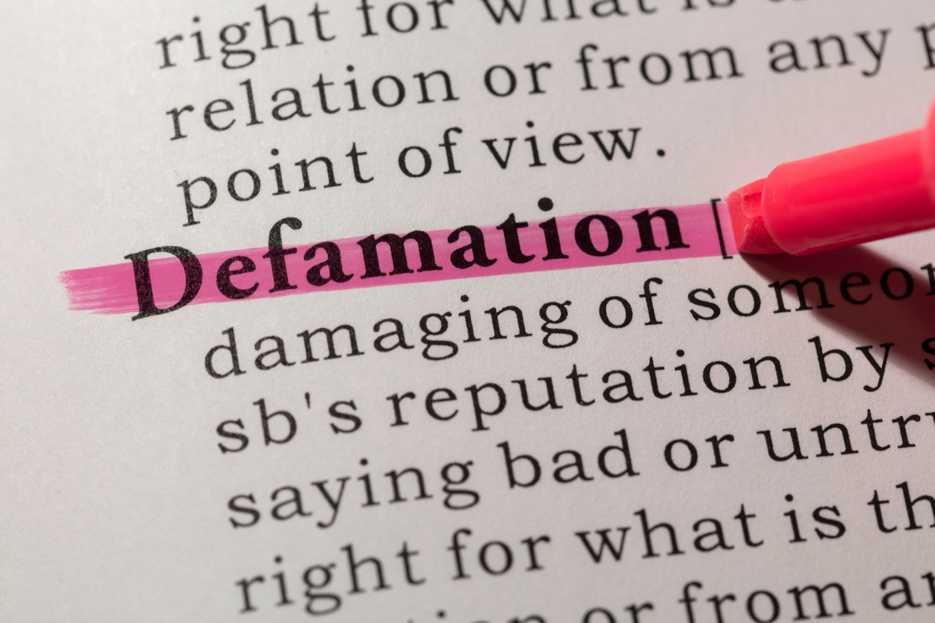In today's digital age, the widespread availability of online platforms and social media has revolutionized the way we communicate and share information . While this connectivity has many positive aspects, it has also led to an increase in the occurrence of defamation cases.
In short, defamation refers to the act of making false statements that harm the reputation of an individual or an organization . These false statements can spread rapidly, causing significant damage to a person's personal or professional life.

Recognizing the need to address the growing issue of defamation, the province of Ontario has enacted the Libel and Slander Act. This legislation provides a legal framework to protect individuals and organizations from the damaging effects of false statements. The Act specifically addresses two forms of defamation that we’ll cover in the following: libel and slander.
Comparing and contrasting: “Libel” and “Slander”
Libel refers to defamatory statements made in written or printed form, such as:
- articles,
- emails,
- social media posts,
- or online comments.
Slander, on the other hand, pertains to spoken words or gestures that harm a person's reputation. Both libel and slander can have severe consequences, potentially affecting one's employment prospects, personal relationships, and overall well-being.
An Overview of the Libel and Slander Act
The Libel and Slander Act establishes the rights and remedies available to those who have been defamed in Ontario. It allows individuals or organizations to take legal action against the party responsible for making false statements.
The Act enables the defamed party to seek damages for harm caused to their reputation, as well as an injunction to prevent further dissemination of the defamatory statements.
It is important to note that the Act has certain limitations and requirements that must be met to pursue a defamation claim successfully. This will be looked at later in this article.
Why should this matter to me?
If you find yourself in a situation where you believe you have been defamed, it is crucial to seek the guidance of an experienced defamation lawyer. A defamation lawyer specializes in this area of law and can provide the necessary expertise and guidance to protect your rights and reputation.
They will assess the circumstances of your case, gather evidence, and help you navigate the legal process to seek appropriate remedies. This where JuriGo comes in, they can connect you – free of charge, with a qualified attorney that can help you look into your legal predicament, whatever it might be.

Haut du formulaire
Navigating Defamation in Ontario: Understanding Libel and Slander Laws
In Ontario, as in many other jurisdictions, defamation encompasses two distinct categories: libel and slander.
As previously covered, libel refers to defamatory statements that are expressed in written or printed form, such as articles, blog posts, social media posts, emails, or online comments. On the other hand, slander refers to defamatory statements that are spoken, gestured, or expressed in a transient or non-permanent form.
Unveiling Libel in Ontario: Understanding Defamation Laws and Remedies
Libel is considered more serious than slander due to the lasting nature of written or printed statements. In Ontario, the Libel and Slander Act specifically addresses libel and provides legal remedies for individuals who have suffered harm to their reputation as a result of false written statements.
For a statement to be considered libelous, it must meet certain criteria. First and foremost, the statement must be false. If a statement is true or can be proven to be true, it generally cannot be considered defamatory.
Additionally, the statement must be published or communicated to a third party, which means it is not enough for the statement to be written; it must also be shared with at least one other person. This is an important threshold that most defamation cases fail to meet.

Furthermore, the statement must harm the reputation of the individual or organization being targeted. Finally, the defamed party must have suffered some form of damage, which can include both economic and non-economic harm.
Defamation Unveiled: Exploring Slander Laws and Remedies in Ontario
Slander, unlike libel, refers to defamatory statements that are spoken or expressed in a non-permanent form. In Ontario, the Libel and Slander Act also covers slander, providing legal recourse for individuals who have been harmed by false spoken statements.
Similar to libel, slanderous statements must meet specific requirements to be legally considered defamatory. The statement must be false, communicated to a third party (other than the plaintiff), harm the reputation of the individual or organization being targeted, and cause some form of damage to the defamed party.
Defamation Defenses and Remedies in Ontario Explained
In Ontario, there are several defenses available to individuals accused of defamation.
These defenses include:
- truth – if the statement is proven to be true.
- absolute privilege – protection for statements made in certain contexts, such as parliamentary proceedings or courtrooms.
- qualified privilege – protection for statements made in the public interest or for the protection of the speaker's legitimate interests.
- fair comment – opinions based on true facts that are honestly expressed.
- responsible communication on matters of public interest – protection for responsible journalism and media reporting.

If a person has been defamed in Ontario, they may pursue legal action to seek remedies and protect their reputation. Remedies available under the Libel and Slander Act include damages, injunctions, and retractions.
It is important to consult with a defamation lawyer in Ontario if you find yourself involved in a libel or slander case. A defamation lawyer can provide expert advice, assess the merits of your case, help gather evidence, and navigate the legal process to protect your rights and seek appropriate remedies.
They will guide you through the complexities of defamation law in Ontario and work towards resolving the matter in the most favorable manner possible.
Seeking Justice and Restoring Reputation: Remedies for Victims
When an individual in Ontario becomes a victim of slander, they have legal options to seek remedies and safeguard their reputation. As we’ve seen, the Libel and Slander Act provides several remedies that can be pursued to address the harm caused by defamatory statements.

Damages – How to go about them?
One available remedy is the award of damages. Damages refer to monetary compensation awarded to the victim for the harm they have suffered because of the slanderous statements.
The number of damages awarded will depend on various factors, including the severity of the defamation and the impact it has had on the victim's personal and professional life.
Injunctions – Court provided assistance
Injunctions are another remedy offered under the Libel and Slander Act. An injunction is a court order that prohibits the further publication or dissemination of defamatory statements. It aims to prevent the continued spread of harmful information and provides protection to the victim's reputation.
Retractions – Undoing the harm
Additionally, the Libel and Slander Act allows for retractions. A retraction involves requesting the publication of a public apology or correction by the party responsible for making the defamatory statements. It provides an opportunity to rectify false information and mitigate the damage caused to the victim's reputation.
Remembering due process
It is important to note that pursuing these remedies requires initiating legal action through the appropriate legal channels. Consulting with a defamation lawyer is highly recommended to navigate the complexities of the legal process and ensure the best possible outcome.
A defamation lawyer will provide expert guidance, assess the merits of the case, gather evidence, and advocate for the victim's rights, ultimately working towards securing the most suitable remedies available under the Libel and Slander Act.
By utilizing the remedies offered under the Libel and Slander Act, victims of slander in Ontario can take proactive steps to protect their reputation, seek justice, and restore their good name.
Bas du formulaire
The Legal Framework: Libel and Slander Act of Ontario
The Libel and Slander Act of Ontario serves as the legal foundation for defamation cases within the province. This legislation defines and addresses both libel and slander, the two forms of defamation.
Libel refers to defamatory statements made through written or printed words, while slander pertains to defamatory statements expressed through spoken words or gestures. By establishing legal parameters for these types of defamation, the Act ensures that individuals who have been defamed have recourse to seek compensation for the damages they have suffered due to false statements that harm their reputation.

The Importance of a Defamation Lawyer
Defamation cases can be intricate and require a deep understanding of the legal nuances involved. Engaging the services of a skilled defamation lawyer who specializes in this area of law is crucial to effectively protect your rights and navigate the complexities of defamation proceedings.
Experience and Expertise
When searching for a defamation lawyer in Ontario, prioritize finding an attorney with substantial experience handling defamation cases.
An experienced lawyer will possess the knowledge and skills necessary to navigate the intricate terrain of defamation law and build a robust case on your behalf. Look for a track record of successful outcomes in defamation matters to gauge the lawyer's expertise in the field.
Reputation and Track Record
Research the lawyer's reputation and track record in handling defamation cases. Read reviews, testimonials, or case outcomes that demonstrate their ability to achieve favorable results for their clients. A lawyer with a solid reputation and a history of successful defamation representations will inspire confidence and increase the likelihood of a positive outcome for your case.
Specialization
Defamation law has its own unique complexities, making it crucial to work with a lawyer who specializes in this specific field. By choosing an attorney who understands the intricacies of defamation law, you can benefit from their focused expertise and effective advocacy for your rights.
Ensure that the lawyer you select has extensive experience in handling defamation cases and stays updated on the latest developments in this area of law.
Communication and Accessibility
Effective communication is essential for a successful attorney-client relationship. When choosing a defamation lawyer, consider their communication style and accessibility.
Look for a lawyer who maintains open lines of communication and promptly addresses your concerns throughout the legal process. Accessible and responsive communication will enable you to stay informed and involved in your case's progress.
Fees and Costs
During your initial consultation, discuss the lawyer's fee structure and any associated costs. Clarify whether they work on a contingency basis, where they only receive payment if you win the case, or if they charge a flat fee or an hourly rate.
Transparency about fees will help you plan your budget accordingly and avoid any surprises down the line. Ensure you fully understand the fee arrangement and any additional expenses that may arise during the course of the legal proceedings.

If you find yourself facing a defamation situation, seeking the assistance of a qualified defamation lawyer is crucial to protect your reputation and pursue the compensation you deserve.
Remember to consider the lawyer's experience, reputation, specialization, communication style, and fee structure when selecting legal representation.
By finding the right defamation lawyer in Ontario, you can increase your chances of a successful outcome and effectively navigate the complexities of defamation law.
Defamation Defense and Legal Protection – Consult with a Specialized Lawyer!
Defamation can have severe consequences for individuals and organizations, both personally and professionally. If you believe you have been defamed, the Libel and Slander Act of Ontario provides a legal framework to protect your reputation and seek compensation for damages suffered.
To navigate the complexities of defamation law effectively, it is crucial to engage the services of an experienced defamation lawyer who can guide you through the legal process and help you achieve a favorable outcome.
Take the time to research and find a reputable defamation lawyer in Ontario who specializes in this area of law.
By doing so, you can ensure that your rights are protected, your voice is heard, and your reputation is safeguarded against false statements.
Simply fill out the form below, and JuriGo will connect you with a defamation lawyer near you!